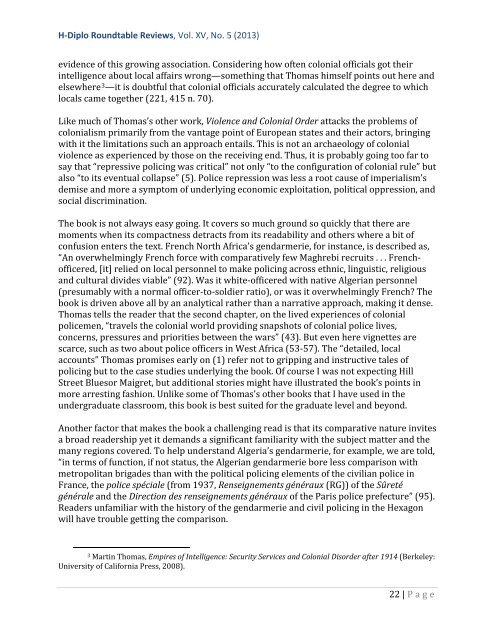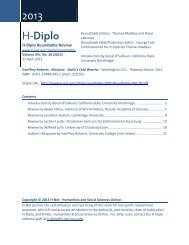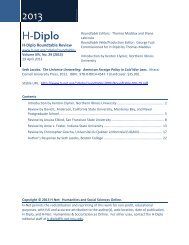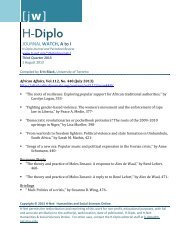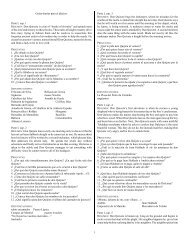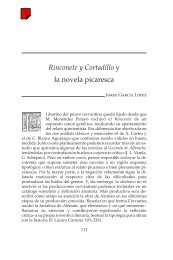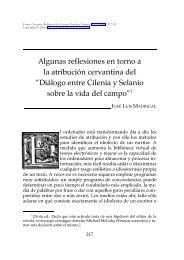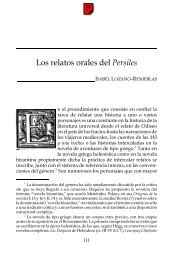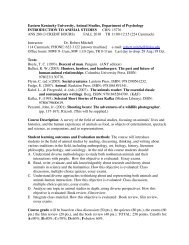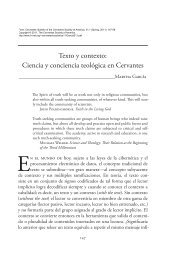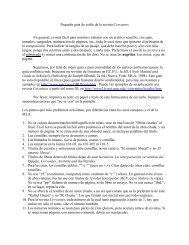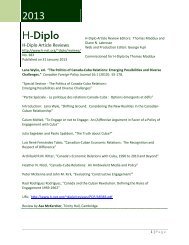H-Diplo Roundtable on Martin Thomas. Violence and ... - H-Net
H-Diplo Roundtable on Martin Thomas. Violence and ... - H-Net
H-Diplo Roundtable on Martin Thomas. Violence and ... - H-Net
You also want an ePaper? Increase the reach of your titles
YUMPU automatically turns print PDFs into web optimized ePapers that Google loves.
H-<str<strong>on</strong>g>Diplo</str<strong>on</strong>g> <str<strong>on</strong>g>Roundtable</str<strong>on</strong>g> Reviews, Vol. XV, No. 5 (2013)<br />
evidence of this growing associati<strong>on</strong>. C<strong>on</strong>sidering how often col<strong>on</strong>ial officials got their<br />
intelligence about local affairs wr<strong>on</strong>g—something that <strong>Thomas</strong> himself points out here <strong>and</strong><br />
elsewhere 3 —it is doubtful that col<strong>on</strong>ial officials accurately calculated the degree to which<br />
locals came together (221, 415 n. 70).<br />
Like much of <strong>Thomas</strong>’s other work, <strong>Violence</strong> <strong>and</strong> Col<strong>on</strong>ial Order attacks the problems of<br />
col<strong>on</strong>ialism primarily from the vantage point of European states <strong>and</strong> their actors, bringing<br />
with it the limitati<strong>on</strong>s such an approach entails. This is not an archaeology of col<strong>on</strong>ial<br />
violence as experienced by those <strong>on</strong> the receiving end. Thus, it is probably going too far to<br />
say that “repressive policing was critical” not <strong>on</strong>ly “to the c<strong>on</strong>figurati<strong>on</strong> of col<strong>on</strong>ial rule” but<br />
also “to its eventual collapse” (5). Police repressi<strong>on</strong> was less a root cause of imperialism’s<br />
demise <strong>and</strong> more a symptom of underlying ec<strong>on</strong>omic exploitati<strong>on</strong>, political oppressi<strong>on</strong>, <strong>and</strong><br />
social discriminati<strong>on</strong>.<br />
The book is not always easy going. It covers so much ground so quickly that there are<br />
moments when its compactness detracts from its readability <strong>and</strong> others where a bit of<br />
c<strong>on</strong>fusi<strong>on</strong> enters the text. French North Africa’s gendarmerie, for instance, is described as,<br />
“An overwhelmingly French force with comparatively few Maghrebi recruits . . . Frenchofficered,<br />
[it] relied <strong>on</strong> local pers<strong>on</strong>nel to make policing across ethnic, linguistic, religious<br />
<strong>and</strong> cultural divides viable” (92). Was it white-officered with native Algerian pers<strong>on</strong>nel<br />
(presumably with a normal officer-to-soldier ratio), or was it overwhelmingly French? The<br />
book is driven above all by an analytical rather than a narrative approach, making it dense.<br />
<strong>Thomas</strong> tells the reader that the sec<strong>on</strong>d chapter, <strong>on</strong> the lived experiences of col<strong>on</strong>ial<br />
policemen, “travels the col<strong>on</strong>ial world providing snapshots of col<strong>on</strong>ial police lives,<br />
c<strong>on</strong>cerns, pressures <strong>and</strong> priorities between the wars” (43). But even here vignettes are<br />
scarce, such as two about police officers in West Africa (53-57). The “detailed, local<br />
accounts” <strong>Thomas</strong> promises early <strong>on</strong> (1) refer not to gripping <strong>and</strong> instructive tales of<br />
policing but to the case studies underlying the book. Of course I was not expecting Hill<br />
Street Bluesor Maigret, but additi<strong>on</strong>al stories might have illustrated the book’s points in<br />
more arresting fashi<strong>on</strong>. Unlike some of <strong>Thomas</strong>’s other books that I have used in the<br />
undergraduate classroom, this book is best suited for the graduate level <strong>and</strong> bey<strong>on</strong>d.<br />
Another factor that makes the book a challenging read is that its comparative nature invites<br />
a broad readership yet it dem<strong>and</strong>s a significant familiarity with the subject matter <strong>and</strong> the<br />
many regi<strong>on</strong>s covered. To help underst<strong>and</strong> Algeria’s gendarmerie, for example, we are told,<br />
“in terms of functi<strong>on</strong>, if not status, the Algerian gendarmerie bore less comparis<strong>on</strong> with<br />
metropolitan brigades than with the political policing elements of the civilian police in<br />
France, the police spéciale (from 1937, Renseignements généraux (RG)) of the Sûreté<br />
générale <strong>and</strong> the Directi<strong>on</strong> des renseignements généraux of the Paris police prefecture” (95).<br />
Readers unfamiliar with the history of the gendarmerie <strong>and</strong> civil policing in the Hexag<strong>on</strong><br />
will have trouble getting the comparis<strong>on</strong>.<br />
3 <strong>Martin</strong> <strong>Thomas</strong>, Empires of Intelligence: Security Services <strong>and</strong> Col<strong>on</strong>ial Disorder after 1914 (Berkeley:<br />
University of California Press, 2008).<br />
22 | P age


